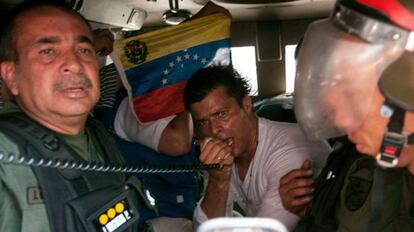Venezuelan opposition leader marks first year in prison
Maduro government has rejected UN demands for Leopoldo López’s release

On February 18, 2014, thousands of Venezuelans dressed in white and holding the country’s tricolor flag converged on the streets of Caracas in support of opposition leader Leopoldo López soon after the government announced it had issued an arrest warrant for him.
In the middle of the convoluted cries and pleas from his supporters, who begged him not to surrender, López voluntarily turned himself in to National Guard officers.
“I am presenting myself before the unfair and corrupt justice system,” López told his supporters through a megaphone before authorities took him away in an armored vehicle.
Since then, the 43-year-old López has been held in solitary confinement at the Ramo Verde military prison outside Caracas. He is charged with instigating the violence that erupted across the country on February 12, 2014, in which two protestors were killed at the hands of the security forces.
During that protest, demonstrators also set fire to the Attorney General’s Office and numerous official vehicles.
While López was nowhere near the violence, the government charged him with conspiracy, intention to commit a crime, public intimidation, arson, aggravated first-degree murder and terrorism. But just before he went on trial, the murder and terrorism charges were dropped.
The press and opposition politicians are not allowed to attend his trial, even though court hearings are generally open to the public in Venezuela. López’s father was banned from the courtroom after he tried to use a spy camera to record the proceedings.
According to Juan Carlos Gutiérrez, López’s lawyer, the prosecution has presented sworn testimonies from 38 witnesses – all officials from the prosecutor’s office or judicial police – that support the charges against the opposition leader.
The defense has not been allowed to present any witnesses.
“All of the testimony is being presented by the prosecutor; it’s the same monologue because there is no connection between the arguments and the evidence,” he said.
Despite this, Gutiérrez said no one has been able to single out López as being the instigator of the violence. In the coming days, two linguistics experts will be called to testify on behalf of the government about the tone of López’s speech prior to the disturbances, the lawyer said.
The press and opposition are not allowed to attend his trial, even though court hearings are public
According to President Nicolás Maduro, López is “the face of fascism” and “the monster of Ramo Verde.”
“He has to pay, he is going to pay. It is as simple as that,” the president said last July in a public speech.
If convicted, López faces up to 14 years in prison.
Last year, a UN working group studying arbitrary detentions concluded López’s rights were being violated and called on the government to release him.
The UN High Commissioner for Human Rights also insisted that Venezuela follow its international obligations and obey the working group’s order. But the Maduro government has ignored all petitions calling for López’s release.
Lilian Tintori, López’s wife, has embarked on an international campaign asking for help to win his release.
“My life has completely changed. I have a lot of responsibilities now,” said Tintori, a former athlete and television presenter. “I am raising my children as best as I can to resist and not grow tired.”
The UN High Commissioner for Human Rights has insisted that Venezuela follow its international obligations and release López
She recently met with US Vice President Joe Biden and José Miguel Insulza, secretary general of the Organization of American States. Tintori has also held talks with Spanish Prime Minister Mariano Rajoy and officials from different international organizations, including Human Rights Watch.
Recently, Andrés Pastrana and Sebastián Piñera, the former presidents of Colombia and Chile, were prohibited from meeting with López in his jail cell during their recent visit to Caracas – a decision that fueled diplomatic tensions.
Last week, Tintori charged that her husband had been physically abused by his jailers and blamed the incident on the international campaign being carried out to win his freedom.
The government has denied all the family’s allegations.
EL PAÍS had sent him a list of questions but, according to his family and lawyers, all the documents López had in his possession were destroyed.
Gutiérrez, who saw his client some days ago, said jail has strengthened López, who spends his time reading, writing and preparing himself for a future political role in his country.







































